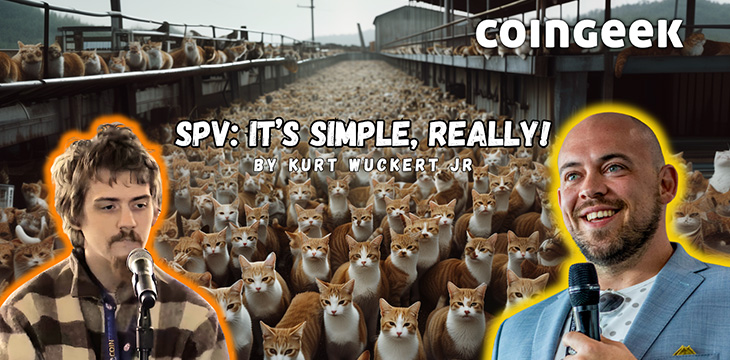
|
Getting your Trinity Audio player ready... |
BTC social media shills are again attempting to “cancel” any discussion of BSV in the public sphere. Notable anti-BSV campaigner Peter McCormack used his influence to pressure financial channel Real Vision to delete tweets pointing to an interview with Unbounded Capital’s leaders.
It’s another example of the “heckler’s veto” being applied to any positive comment about BSV in a popular forum, hunting out and shutting down the BSV industry’s message before it escapes its permitted boundaries and spreads in the business community.
What happened?
Screenshots show a tweet about the interview posted on January 26, 2022, by Real Vision’s Twitter account. However, following a post from McCormack directed at Real Vision founder Raoul Pal, the original tweet was deleted soon after:
McCorecucked pic.twitter.com/RG73wfIkfh
— Randy 𝔅𝔖𝓥 2️⃣0️⃣2️⃣4️⃣ 🅷🅿🆁🅱🆃🅲🅽🆉🆃🅽 (@Bitc01nSV2024) January 25, 2022
Neither Pal nor Real Vision offered any explanation for deleting the tweet, although the interview video itself remains published on its website.
Can’t have people find out how useful Bitcoin is at scale!
— Streaming Sats (₿) .210 (@Streaming_Sats) January 25, 2022
Real Vision is an on-demand video channel focusing on finance, business, investment and economics. It publishes new videos every weekday, and has a paid subscription model for extra tutorials, expert analysis and archived in-depth discussions. Their information page says, “We only allow the smartest investors and brightest minds on Real Vision.”
“Our mission is to democratize quality financial research so that everyone, not just the financial elite, can get the honest truth about what’s really going on in the financial markets.”
Real Vision has interviewed a broad selection of personalities from across the cryptocurrency world, including Michael Saylor, Vitalik Buterin, Charles Hoskinson, Anthony Pompliano, Tuur Demeester and Erik Voorhees, as well as Fundstrat’s Thomas Lee and ConsenSys’s Joe Lubin.
Interestingly, BTC proponents don’t seem to mind as much if guests representing other non-BTC blockchains share their ideas. They seem to have a particular problem with BSV.
In McCormack’s case, his anti-BSV stance is perhaps understandable as he has an ongoing legal dispute with Bitcoin creator Dr. Craig S. Wright. However, this dispute began as a result of McCormack’s lengthy anti-BSV (and anti-Wright) campaigns on social media, not the other way around.
Similar pressure campaigns can be seen whenever Dr. Wright is invited to speak at an event, or if a prominent media personality is scheduled to speak at a BSV-focused event like CoinGeek Live. A notable example was the instant online browbeating of entrepreneur Gary Vaynerchuk following the announcement he would speak at CoinGeek Live in September 2021. Fearing an ongoing negative campaign, Vaynerchuk withdrew from the event.
Bitcoin Heckler’s Veto is not a grassroots campaign
“Heckler’s Veto” is an American term, defined by Wikipedia as “a situation in which a party who disagrees with a speaker’s message is able to unilaterally trigger events that result in the speaker being silenced.” It is regarded as a threat to free speech and open discussion.
There is little chance these actions in the Bitcoin space are organic or grassroots. Long before the letters “BSV” or even BCH became known, “small blocker” supporters in BTC would attempt to shut down any suggestion that Bitcoin transaction blocks should grow larger than 1MB in size.
Why is this? It should have been the kind of technical discussion/debate that would lead to better outcomes for the entire industry. The 1MB block size limit isn’t mentioned in Satoshi Nakamoto’s original Bitcoin white paper or protocol, and was imposed temporarily in Bitcoin’s early days to prevent bad actors destroying Bitcoin with “spam transactions.”
But retaining that limit long past its initial use-case, and making BTC effectively useless as world money (4-5 transactions per second worldwide) has served a purpose. It makes the “sidechain” business model of companies like Blockstream a lot more profitable, for starters. It inflates per-transaction fees. It also serves the BTC-as-digital-gold narrative, encouraging users to buy the asset and “HODL” it in reserve, waiting for the unit price to increase. Actually spending BTC as money triggers a series of insults and put-downs if the price increases, with comments usually along the lines of “think of how much money you’d have now if you hadn’t bought that.”
But BSV has proven since 2017 and 2018 that Bitcoin with unbounded transaction block sizes actually works well, keeps fee extremely low, and can even process large amounts of non-payment data. Moreover, Satoshi Nakamoto himself actively supports the technology and its use cases.
Rusted-on BTC enthusiasts and large bagholders (and even Bitcoin’s political enemies) cannot abide that. There simply cannot be an alternative that proves their arguments, and years of coordinated trolling, wrong. Bitcoin, they maintain, can only be a static digital asset for speculative trading and nothing more. Therefore, they must launch directed attacks on Dr. Wright’s character and BSV itself, claiming without any evidence or merit that BSV is “a scam.” They are never able to show exactly what the scam is, or show that BSV’s technology doesn’t perform well—but that’s not the way social media works, and the heckler’s veto is a common “debating” tactic in the 21st century.
It’s a shame that public figures feel driven to give in to their pressure tactics, and withdraw from public discussions on BSV. Both BTC and BSV supporters should be free to present their honest arguments in public, leading to rational decisions. BSV can only continue to prove itself with functionality and apps that work, hoping to break through the noise eventually.
Follow CoinGeek’s Crypto Crime Cartel series, which delves into the stream of groups—a from BitMEX to Binance, Bitcoin.com, Blockstream, ShapeShift, Coinbase, Ripple,
Ethereum, FTX and Tether—who have co-opted the digital asset revolution and turned the industry into a minefield for naïve (and even experienced) players in the market.

 11-22-2024
11-22-2024


